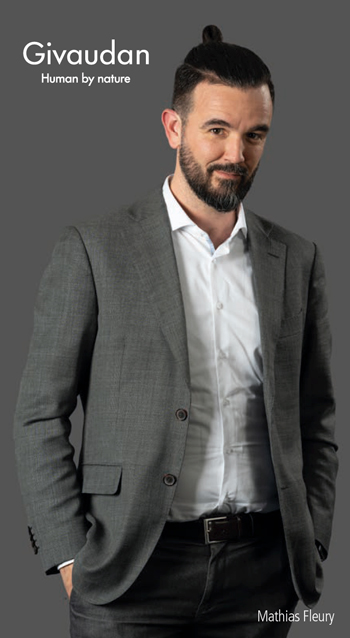
Introducing a Sustainable Skincare Revolution with Naturally Sourced Retinol
Interview with Mathias Fleury,
Head of Category (Actives) at Givaudan Active Beauty
Mathias Fleury, Head of Category (Actives) at Givaudan Active Beauty introduces RetiLife™, an industry-first 100% natural-origin retinol, developed by Givaudan Active Beauty.
What is RetiLife™ and why is it being hailed as a ‘breakthrough evolution’ for the cosmetic industry?
RetiLife™ is the first 100% natural-origin concentrated retinol. It’s a game changer because retinol is traditionally produced using a petrochemical process. This involves the use of synthetic raw materials – which are not very environmentally friendly – as well as the use of a synthetic carrier, stabilised by synthetic antioxidants. And, as both Beauty brands and consumers alike want to make much greener choices regarding what goes in their products and on their skin, RetiLife™ really meets this need for a more sustainable alternative. This is also key because of retinol’s huge popularity and effectiveness as a cosmetic active, which is why it is in such high demand. In fact, RetiLife™ is the most sustainable retinol on the market, but the exciting part is that RetiLife™ still delivers the same biological and clinical anti-ageing results as its synthetic counterpart, because it’s simply the same chemical molecule.
What are the benefits of RetiLife™?
Just like other regular retinol on the market, RetiLife™ is a concentrated retinol solution (around 50%) with powerful anti-ageing properties. It can help skin to age better, and has an anti-wrinkle effect: it helps to firm and smooth skin, as well as being antioxidant and promoting hyaluronic acid production.
How is RetiLife™ different to the way retinol is usually made available?
Until now, retinol had traditionally been produced using petrochemical synthesis, added to a synthetic carrier such as polysorbate, and stabilised by potent antioxidants such as BHT and BHA. These are industrial chemicals which are on the beauty industry's blacklist and are among the industry’s ‘dirty dozen’ ingredients that producers try and avoid, along with other well-known substances like formaldehyde and parabens. Ingredients like these are not in line with consumers' strong desire for clean, green beauty. In our industry, customers are also seeking ingredients that are not only natural, but kinder to the planet, whilst still meeting consumer desires and expectations for formulations that work. RetiLife™ works very effectively, but is made naturally via fermentation, added to a natural carrier and stabilised by a green and natural antioxidant system. The end result is 100% natural origin content.
RetiLife™ is produced using biotech processes: what does that involve?
RetiLife™ is manufactured naturally using white biotechnology, and more precisely fermentation, a branch of biotech that uses living cells such as yeast, moulds, bacteria, plants and enzymes to manufacture products that have a much better, far more sustainable carbon footprint. White biotechnology is now increasingly being used as a more sustainable alternative to chemical or industrial manufacturing processes. This process requires less energy and creates less waste during production. To produce RetiLife™, we used a white biotech process that combines plant sugars with fermentation, followed by a simple purification stage. For its finished product, RetiLife™ uses a sunflower oil as a carrier, and is stabilised using natural antioxidants, mostly tocopherol (vitamin E), combined with rosemary extract. In terms of environmental footprint, RetiLife™ has zero fossil-based carbon, compared to traditional retinol, which uses a more complicated process and typically requires synthetic, unsustainable solvents.
How did you evaluate the efficacy of this natural retinol?
To test efficacy, we undertook several biological evaluations for RetiLife™, including an in vitro test for its antioxidant benefits, and two ex vivo tests for anti-ageing performance and to test skin penetration. Our results showed that both RetiLife™, just like its chemical version, reduced harmful molecules called ROS (reactive oxygen species) by -54% and protected the skin from ROS damage to promote healthier skin. We also found that RetiLife™ has a similar anti-ageing activity as the chemical retinol benchmark, and boosts hyaluronic acid production by +29%. Finally, using human skin explant, we found that RetiLife™ penetrates further into the skin than the chemical retinol benchmark, and in a higher proportion (1.27 times more) demonstrating a better bioavailability, thanks to the naturalness of its chassis.
What kind of formulations can RetiLife™ be used for?
RetiLife™ can be used within facial care products, anti-ageing serums and creams, night creams, anti-wrinkle serums, and skincare for mature skin.
To find out more, visit https://bit.ly/3Yo9Kpp



